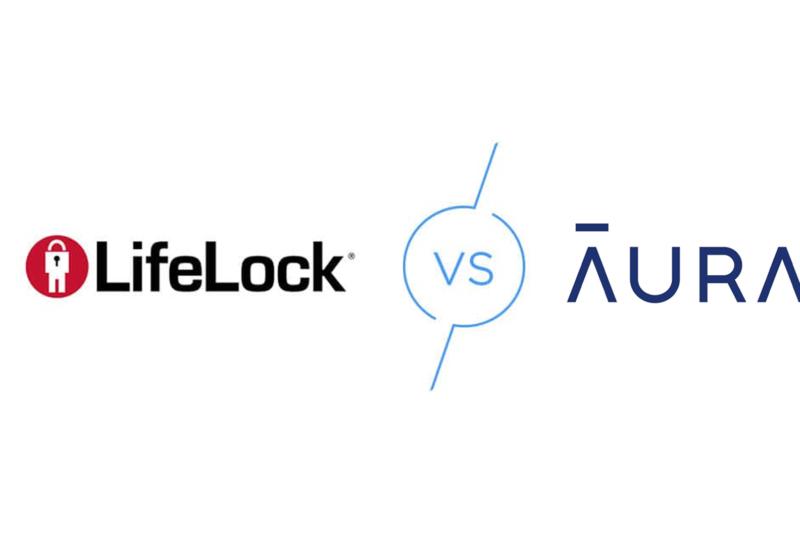Start Building Your Child’s Credit
When it comes to protecting your identity and personal information in today’s digital age, there are numerous options available. Two popular choices that often come up in the conversation are Aura and LifeLock. Both of these companies offer comprehensive identity theft protection services, but which one is right for you? In this article, we’ll compare Aura vs. LifeLock based on their features and pricing to help you make an informed decision about which service best suits your needs.
LifeLock vs. Aura—Overview
Both Aura and LifeLock offer valuable solutions for safeguarding your personal information against potential threats.
Aura boasts a customer base of more than one million users, making it a substantial contender in the field. While not as widely adopted as some of its competitors, Aura has made a reputation for itself in nearly two decades of operation. Its acquisition of Identity Guard—a highly regarded identity theft protection solution that has earned the trust of more than 38 million Americans—has strengthened Aura’s position in the personal cybersecurity industry.
Meanwhile, LifeLock is owned by Norton LifeLock, a well-known antivirus company. LifeLock boasts an impressive user base of over 80 million users globally, positioning itself as one of the industry leaders in identity protection. Despite not being the most budget-friendly option, it offers a wide array of services bundled within its pricing.
Features and Key Differences

Aura and LifeLock are two prominent players in the identity protection and cybersecurity industries, each offering a range of features to safeguard individuals from identity theft and related threats. Here’s a comparison of their features and key differences across the following aspects:
- Identity monitoring
- Credit monitoring
- Financial account monitoring
- Identity theft insurance
- Additional security services
- Pricing and plans
Identity Monitoring
Identity monitoring is a crucial aspect of any comprehensive identity protection service. It involves continuous surveillance of various data sources to detect suspicious activities or signs of potential identity theft.
Both Aura and LifeLock provide comparable levels of identity monitoring. However, LifeLock goes a step further by incorporating social media monitoring into its services, while Aura expands its watchlist to encompass other items, such as:
- Credit cards
- Email addresses
Aura’s standout feature lies in the quality of its alerts. Every alert Aura generates contains vital details regarding the incident, including what steps you should take and whom to contact for assistance. This ensures that you’re never left in the dark or bewildered when confronted with potential indicators of identity theft.
Credit Monitoring
Credit monitoring is another essential feature that helps you keep track of your credit report and receive alerts from the three major credit bureaus for any changes or potential fraud attempts.
Aura includes three-bureau credit monitoring on all its plans, including access to credit reports and credit score tracking to help users keep tabs on their credit health.
LifeLock provides one-bureau credit monitoring on Select and Advantage plans. Three-bureau monitoring is only available on the Ultimate Plus plan, along with credit score tracking to detect any unauthorized credit activity.
Financial Account Monitoring
Financial account monitoring goes hand in hand with credit monitoring. It involves keeping an eye on your bank accounts, credit cards, and other financial tools for any unusual transactions or unauthorized access attempts.
Every Aura plan offers account monitoring for:
- Credit cards
- Investment accounts
- Checking and savings accounts
- 401k
- Changes to banking information
Each plan also includes lost wallet remediation and high-risk transaction alerts, which notify users of suspicious activity related to their bank accounts, credit cards, and other financial assets.
LifeLock similarly monitors financial accounts, keeping an eye on transactions and activities for signs of fraud or unauthorized access. However, the monitoring depends on the plan you choose—for example, only the Ultimate Plus plan offers services similar to those that Aura offers on all its plans. The Standard plan doesn’t offer account monitoring, while the Advantage plan only monitors bank accounts and credit card accounts.
Identity Theft Insurance
Identity theft insurance is an added layer of protection that covers expenses incurred due to identity theft incidents, such as legal fees or lost wages during recovery. The specifics may vary between the two providers, so comparing their offerings is important when considering this aspect.
Aura offers identity theft insurance coverage with benefits of up to $1,000,000 for each adult member, up to $2,000,000 on Couples plans, and up to $5,000,000 on Family plans. Stolen funds reimbursement comes with coverage of up to $1,000,000.
LifeLock also provides identity theft insurance with a coverage of $1,000,000 on all plans, helping users recover their losses in the event of identity theft. However, the amount only covers lawyers and experts. Reimbursement for stolen funds and personal expenses is limited to as low as $25,000, varying by plan.
Additional Security Services
In addition to the core features we mentioned, both Aura and LifeLock offer special security services such as antivirus or VPN to enhance overall protection against various forms of online threats. With every plan, Aura offers military-grade VPN access and professional antivirus software for Windows and Mac.
Meanwhile, LifeLock only provides Norton antivirus protection and VPN access with the more expensive Norton add-on.
Pricing and Plans
Pricing and plans are among the most significant factors when choosing between Aura and LifeLock. It’s essential to evaluate the cost-effectiveness of each provider’s offerings based on your specific needs and budget.
When it comes to pricing, Aura stands out as the more affordable option between the two, with plans catering to different needs and budgets. Here’s an overview of the costs of Aura’s plans:
| Pricing | Individual | Couple | Family |
| Monthly cost | $15 | $29 | $45 |
| Monthly cost–billed Annually | $12 | $22 | $32 |
| Annual cost | $144 | $264 | $540 |
LifeLock’s pricing and plans can be somewhat complex due to the inclusion of various add-ons and a comparatively high renewal fee. Here’s LifeLock’s pricing structure:
| LifeLock Plan | Individual | Family (Two Adults) | Family (Two Adults and Five Children) |
| Standard | $11.99/month | $23.99/month | $35.99/month |
| Advantage | $22.99/month | $45.99/month | $57.99/month |
| Unlimited Plus | $34.99/month | $69.99/month | $79.99/month |
When comparing Aura and LifeLock pricing, it becomes evident that Aura offers more value across all their plans. While LifeLock’s plans can be complex with add-ons and higher renewal fees, Aura provides comprehensive identity protection services at competitive prices, making it a cost-effective choice for individuals seeking value in identity theft protection.
Which Identity Protection Service Should You Choose?

Choosing between Aura and LifeLock depends on your specific needs and priorities. Aura offers robust identity protection services, but its individual plan is pricier than LifeLock’s basic offering. While Aura includes a VPN and antivirus software, there’s room for improvement in its quality and coverage.
Meanwhile, LifeLock’s below-average reimbursement offerings on lower-tier options and the requirement for add-ons and high renewal costs can be a drawback. What’s more, LifeLock has faced a recent data breach, which may raise safety concerns for some users.
If you need an affordable and comprehensive protection service that combines Aura’s accessibility and LifeLock’s richness of features, FreeKick is your ideal solution—especially if you have children, considering a child’s identity is stolen every 30 seconds.
FreeKick—Comprehensive Identity Protection and Credit Building for Children and Young Adults
FreeKick is a solution provided by Austin Capital Bank that offers a wide range of services that effectively monitor, protect, and recover the identities of your entire family. FreeKick plans provide monitoring services for up to two parents and six children between the ages of 0 and 25, while children aged 13 to 25 can also benefit from parent-sponsored credit building.
Identity Protection Services
FreeKick gives you complete peace of mind through its comprehensive set of security features for adults as well as minor children:
| Services for Adult Children and Parents | Services for Minor Children |
| • Credit profile monitoring • Social Security number monitoring • Dark web monitoring for personal information • Up to $1 million identity theft insurance • Full-service white-glove concierge credit restoration • Lost wallet protection • Court records monitoring • Change of address monitoring • Non-credit (Payday) loan monitoring • Free FICO® Score monthly • FICO® Score factors • Experian credit report monthly | • Credit profile monitoring • Social Security number monitoring • Dark web monitoring for children’s personal information • Up to $1 million identity theft insurance • Full-service white-glove concierge credit restoration • Sex offender monitoring—based on sponsor parent’s address |
Parent-Sponsored Credit Building and Credit Profile Monitoring
In addition to ID monitoring, FreeKick offers an automated credit building feature to help your children establish a strong financial foundation from a young age—which could potentially save them over $200,000 throughout their lifetime.
The process is simple—once your child reaches the age of 13, you can activate the credit building feature from your account dashboard. Once they turn 18, your child can activate credit reporting and have a credit account of $1,000 reported to all three major consumer credit bureaus:
To get started, follow these steps:
- Create a FreeKick Account—Go to FreeKick.bank and choose a plan that suits your needs and budget
- Set It and Forget It—Once you’ve activated the credit building process, FreeKick will create a 12-month credit history for your child via a no-interest installment loan
- Keep Growing—After 12 months, you can choose to renew your account and continue building your child’s credit score or terminate it and get a full refund of your initial deposit
FreeKick Pricing
FreeKick offers flexible and affordable plans for different family budgets. Both plans come with FDIC insurance coverage of up to $250,000 and credit building for six children aged 13–25.
| FDIC-Insured Deposit | Annual Fee |
| $3,000 | $0 (Free) |
| No deposit | $149 |
Kickstart your child’s financial journey while enjoying comprehensive identity protection for your entire family—sign up for FreeKick today.

Freekick provides a double dose of financial empowerment and security for your whole family. It helps teens and young adults build strong credit profiles and offers identity motoring for up to two adult parents and six children under 25.





